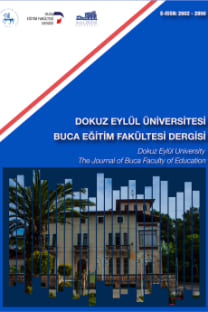ÇEVRE EĞİTİMİ ÖZ-YETERLİK ALGISI ÜZERİNE BİR ÖLÇEK GELİŞTİRME ÇALIŞMASI
ÖZET: Bu çalışmada, “Çevre Eğitimi Öz-yeterlik Algısı Ölçeği” geliştirilmiştir. Ölçeğin güvenirlik katsayısı 0.76 olup toplam varyansın %61.80’ ini açıklamaktadır. Ölçek dört alt boyutludur (“Akademik Yetkinlik Algısı”, “Sorumluluk Algısı”, “Öğretici Yetkinlik Algısı” ve Yönlendirebilme Algısı”). Doğrulayıcı faktör analizi sonuçları da ölçeğin 4 alt boyutlu yapıya sahip olduğunu desteklemektedir. Ölçeğin ayırt edicilik gücünü sınamak açısından Çevre Bilimi dersi alan (3. ve 4. sınıflar) ve almayan öğrenciler (1. ve 2. sınıflar) toplam 328 sınıf öğretmeni adayı üzerinde yapılan analizler, çevrebilimi dersi alan sınıf öğretmeni adaylarının “Akademik Yetkinlik Algısı” ve “Yönlendirebilme Algısı” alt ölçeklerinden aldıkları puanların ortalamaları, bu dersi henüz almayan öğrencilere oranla daha yüksektir (P
Anahtar Kelimeler:
Çevre eğitimi, öz-yeterlik, açıklayıcı ve doğrulayıcı faktör analizi, sınıf öğretmenliğibölümü, öğretmen yetiştirme
A SCALE DEVELOPMENT STUDY ON SELF-EFFICACY BELIEFS THROUGH ENVIRONMENTAL EDUCATION
This study presented the development of a reliable and valid scale, The Scale of Self- Efficacy Belief toward Environmental Education, for use in Turkish context. The reliability coefficient of this scale is 0.76 and it explains 61.80% of total variance. The scale has four sub-scales (“Academic Competence Perception”, “Responsibility Perception”, “Instructive Competence Perception”, and “Guidance Perception”). Confirmatory factor analysis results support that the scale consisted of four subscales. The grade point average from subscales in “Guidance Perception” and “Academic Efficacy Perception” of the prospective elementary teachers (N:328) who have taken a course in Environmental Science are relatively higher than those who still have not taken this course (P<0.05).
Keywords:
Environmental education, self- efficacy, exploratory and confirmatory factor analysis, elementaryteaching, teacher training,
___
- Akkoyunlu, B., Orhan, F., Umay, A. (2005). Bilgisayar öğretmenliği öz-yeterliği ölçeği geliştirme çalışması”. Hacettepe Üniversitesi Eğitim Fakültesi Dergisi, 29, 1-8.
- Bandura, A. (1986). Social foundations of thought and action: A social cognivite theory. Englewood Cliffs. New Jersey: Prentice Hall.
- Bandura, A. (2001). Guide for constructing self-efficacy scales. Stanford, CA: Department of Psychology, Stanford University.
- Bentler, P.M. (1990). Comparative fit indexes in structurel models, Psychological Bulletin, 107, 238-246.
- Browers, A., Tomic, W. (2000). A longitudianal study of teacher burnout and perceived self- efficacy in classroom management, Teaching and Teacher Education, 16, 239-253.
- Dinçer, M. (1996). Çevre Gönüllü Kuruluşları. Ankara: Türkiye Çevre Vakfı Sorunları Yayınları No:110.
- Doğanay, A., Sarı, M. (2007). Öğretim amaçlarının belirlenmesi, ifade edilmesi ve uygun içeriğin seçimi, Öğretim İlke ve Yöntemleri, (Ed. Ahmet Doğanay), Ankara: PegemA Yayıncılık.
- Eden, D., Aviram, A. (1993). Self-efficacy training to speed reemployment:Helping people to help tehemselves, Journal of Applied Psychology, 78, 3, 352-360.
- Ekici, G. (2005). Biyoloji Öz-yeterlik Ölçeğinin Geçerlik ve Güvenirliği, Hacettepe Üniversitesi Eğitim Fakültesi Dergisi, 29, 85-94.
- Friedman, I., Kass, E. (2001). Teacher self-efficacy: A classroom-organization conceptualization, Teaching and Teacher Education, 18, 675-686.
- Gibson, S., Dembo, M. H. (1984). Teacher efficacy: a construct validation, Journal of Educational Psychology, 76, 569-582.
- Gist, M. E. (1989). The influence of training method on self-efficacy and idea generation among managers, Personel Psychology, 42, 4, 787-805.
- Jöreskog, K. G. Sörbom, D. (1993). Lisrel 8: Structurel equation modeling with the simplis command language, Lilncolnwood, IL, Scientific Software International, Inc.
- Kapıcı, Z. U. (2003). İlköğretim öğretmenlerinin öz-yeterlik algıları ve sınıf-içi iletişim örüntüleri. Yüksek Lisans Tezi, Dokuz Eylül Üniversitesi Eğitim Bilimleri Enstitüsü: İzmir.
- Stajkovic, A.D., Luthans, F. (1998). Self-efficacy and work-related performance: A meta- analysis, Psychology Bulletin, 124, 240-261.
- Thompson (2005). Exploratory and confirmatory factor analsis: understanding concepts and aplications, Washington DC. American Psychological Association.
- Tschannen-Moran, M., Woolfolk, A. H. (2001). Teacher efficacy: Capturing an elusive construct, Teaching and Teacher Education, 17, 783-805.
- Yayın Aralığı: Yılda 4 Sayı
- Başlangıç: 1992
- Yayıncı: Dokuz Eylül Üniversitesi
Sayıdaki Diğer Makaleler
İÇ GÖÇ YAŞAMIŞ VE YAŞAMAMIŞ ÇOCUKLARIN OKULDA UYUMU
KÖY ENSTİTÜLERİNDE SANAT EĞİTİMİ VE DÖNEMİN YÖNETİCİLERİNİN SANATA YAKLAŞIMLARI
OKULLARDA SİGARA EĞİTİMİNE YÖNELİK YAPILAN DENEYSEL ARAŞTIRMALARIN DEĞERLENDİRİLMESİ
ÜNİVERSİTE ÖĞRENCİLERİNİN KİŞİLER ARASI İLİŞKİ TARZLARI VE MİZAH TARZLARI
VİDEO MODEL DESTEKLİ ÖĞRETİMİN GİTAR PERFORMANSINA ETKİSİ
ÇEVRE EĞİTİMİ ÖZ-YETERLİK ALGISI ÜZERİNE BİR ÖLÇEK GELİŞTİRME ÇALIŞMASI
Adem ÖZDEMİR, Neşe AYDIN, Ruken Akar VURAL
MÜZİK ÖĞRETMENİ ADAYLARININ MÜZİK TARİHİ DERSİNE YÖNELİK GÖRÜŞLERİ
